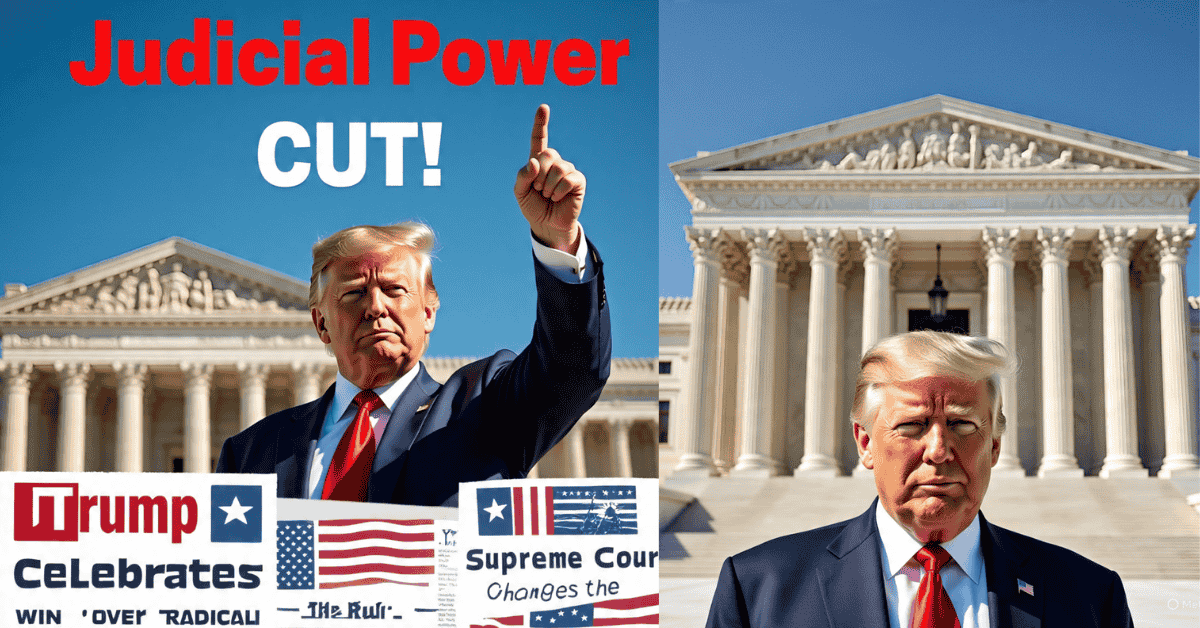Trump Applauds Supreme Court Ruling on Judges’ Power
Former President Donald Trump is celebrating a recent U.S. Supreme Court decision that limits the power of lower federal judges to block nationwide policies with a single ruling. The court’s decision came in a 6-3 vote, and Trump says it marks a major step toward restoring presidential authority.
What Did the Supreme Court Rule?
On Friday, the Supreme Court ruled that federal judges cannot issue what’s called a “universal injunction” — a type of court order that blocks a law or executive action from being enforced anywhere in the country, even if the case is about a specific person or state.
The ruling now restricts judges to issuing orders that only apply to the people or groups involved in a particular lawsuit.
The court did not weigh in on the underlying issue of birthright citizenship, which was part of the original case. Instead, the justices focused only on the question: Do judges have the legal authority to block nationwide policies on their own?
Justice Amy Coney Barrett, writing for the majority, said that lower courts have no such power unless Congress gives it to them — which it hasn’t.
“A universal injunction can only be used in rare cases,” Barrett wrote, “and federal courts haven’t been given that power by Congress.”
Trump’s Reaction: “A Victory for the People”
Just over an hour after the ruling, Trump held a press conference, calling the decision a win for the presidency and for voters.
“This stops a colossal abuse of power,” Trump said. “A few far-left judges were blocking the policies Americans voted for by overstepping their legal limits.”
Trump criticized these judges for trying to “make laws for the entire country” when they were only meant to rule on specific cases. He added that such actions had blocked many of his executive orders during his time in office.
The Birthright Citizenship Debate
The legal battle started when federal judges in Maryland, Massachusetts, and Washington blocked Trump’s 2019 executive order aimed at changing how birthright citizenship is handled. These judges stopped the policy from taking effect nationwide, which led to the Supreme Court review.
Although the birthright citizenship order sparked the case, the justices made it clear that they were not deciding whether that order is legal. Instead, they only addressed the process courts use to block presidential policies.
Dissenting Opinion: A Threat to the Constitution?
Justice Ketanji Brown Jackson disagreed strongly with the ruling. In her dissent, she argued that the new decision gives too much power to the president and makes it harder for courts to stop actions that may violate the Constitution.
“This opens the door for presidents to violate the law,” Jackson warned. “It’s a real threat to the rule of law in our country.”
Justice Barrett responded by saying Jackson’s view ignored more than 200 years of legal precedent.
Why This Ruling Matters
This Supreme Court decision could affect future legal challenges against presidential actions. For example:
-
It may now be harder for activist groups or states to block executive orders immediately.
-
Future presidents — regardless of party — may have more freedom to enforce policies while lawsuits play out.
This decision also highlights an ongoing battle over who has more power: the president or the courts.
The Supreme Court’s ruling marks a big change in how lawsuits can affect national policy. For Donald Trump, it’s a symbolic win against what he calls “radical judges.” For critics, it’s a worrying sign that presidential power is expanding too far.
